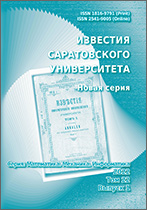|
This article is cited in 2 scientific papers (total in 2 papers)
Scientific Part
Computer Sciences
Optimal solution in the model of control over an economic system in the condition of a mass disease
I. V. Lutoshkin, M. S. Rybina
Ulyanovsk State University, 42 Leo Tolstoy St., Ulyanovsk 432017, Russia
Abstract:
In the conditions of а mass disease, governing bodies of an economic system face a number of tasks related to the need to minimize its negative effects. This requires a tool that allows timely predicting the dynamics of the situation and determining what measures need to be taken. In this paper, a specialized mathematical model is proposed as such a tool, taking into account socio-biological and economic factors. The model is a dynamic optimal control problem with a delay in phase variables. The values of the model parameters were estimated using statistical data on the COVID-19 pandemic in the Russian Federation and the Ulyanovsk region. As target functionals, the following are considered: “social criterion” — a decrease in the number of cases; “economic criterion” — an increase in the relative profit of an economic system. To solve the problem, the authors apply a modification of the numerical parameterization method developed in their early studies. The article presents and analyzes the results of the numerical experiment aimed at studying the obtained optimal solutions. It is shown that: the optimal solution for social and economic criteria when changing budgets is stable; most of the parameters of the optimal solution are weakly elastic relative to the values of variables considered; the parameters of the optimal solution when using the economic criterion are more susceptible to change than when using the social criterion; the nature of the change in the parameters of the optimal solution for the Ulyanovsk region and for the Russian Federation is similar. Thus, the paper offers a tool for analyzing an economic problem in conditions of mass disease and confirms the applicability of the tool for finding optimal management strategies in various economic systems.
Key words:
optimal control, mathematical modeling, optimal solution analysis, economic system, mass disease, COVID-19.
Received: 22.11.2022
Accepted: 25.12.2022
Citation:
I. V. Lutoshkin, M. S. Rybina, “Optimal solution in the model of control over an economic system in the condition of a mass disease”, Izv. Saratov Univ. Math. Mech. Inform., 23:2 (2023), 264–273
Linking options:
https://www.mathnet.ru/eng/isu983 https://www.mathnet.ru/eng/isu/v23/i2/p264
|

|




 Contact us:
Contact us: Terms of Use
Terms of Use
 Registration to the website
Registration to the website Logotypes
Logotypes







 Citation in format
Citation in format 
